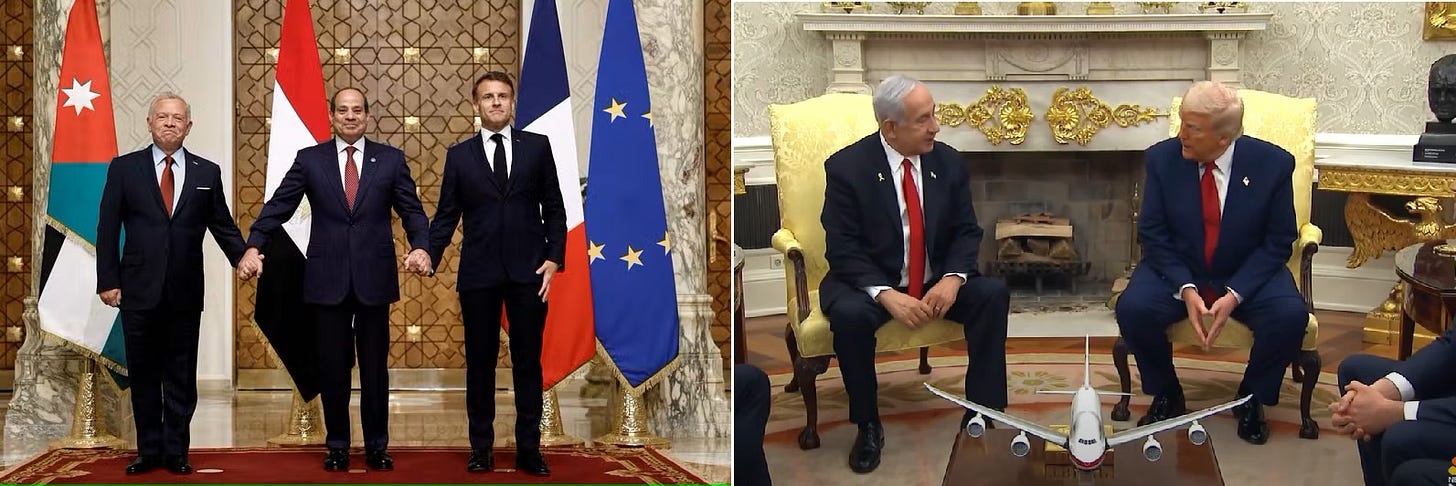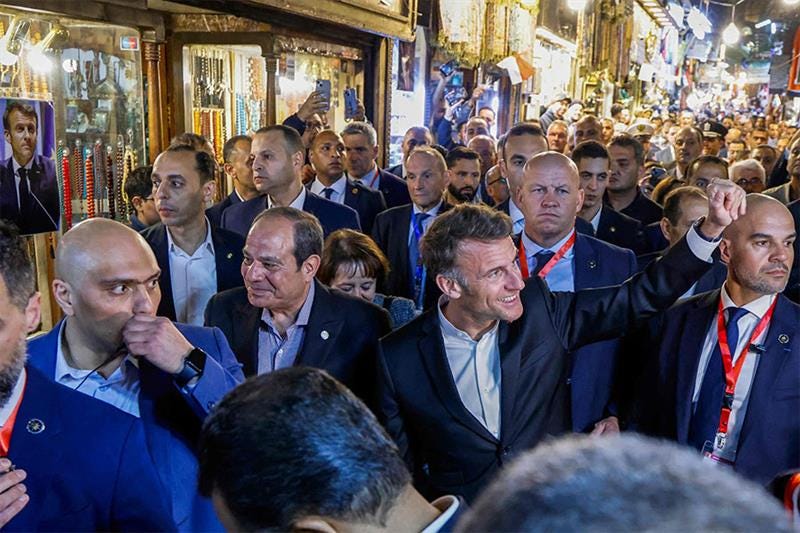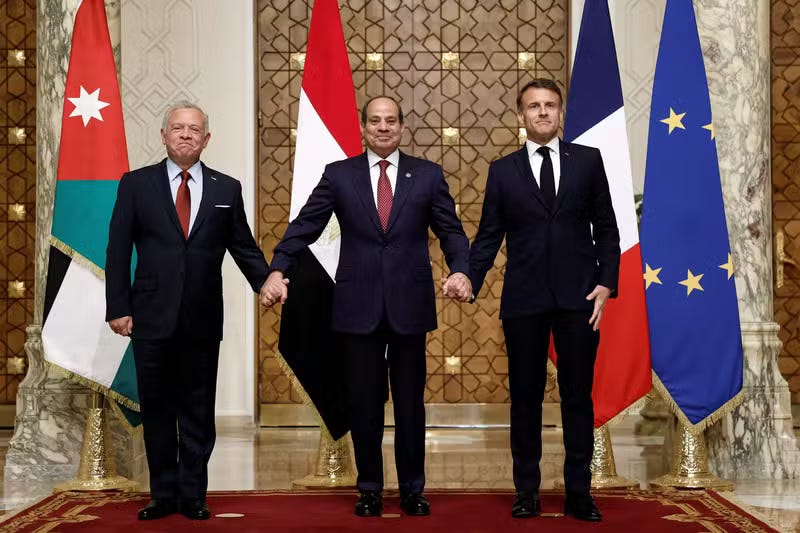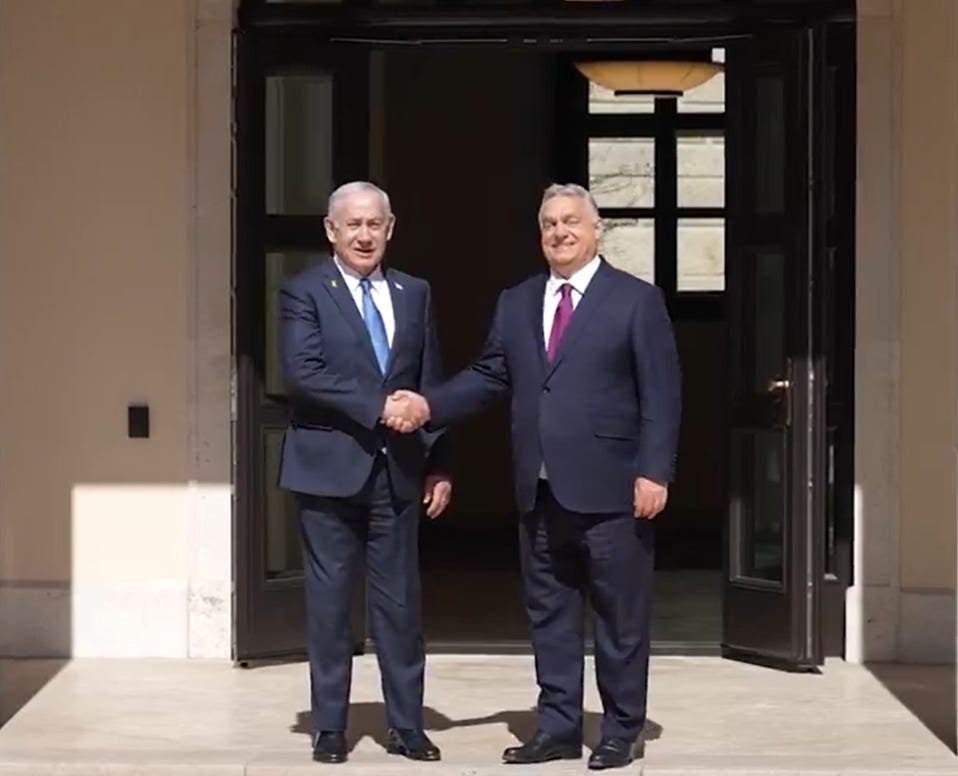Three Meetings and a Phone Call
What do Egypt and France have in common? Both countries are key regional players with disproportionate impact on the international geopolitical scene, and both have been experiencing strong attempts at sidelining by rival actors seeking to supplant or neutralize their roles.
France is leading the charge to try to wrest control of the chaos unfolding in the wake of the American withdrawal from Europe and its rapprochement with Russia. As the two superpowers thaw their relationship, Europe has found itself increasingly sidelined by a new geopolitical reality that it has not yet come to terms with.
Meanwhile in the Middle East, Egypt came under extraordinary pressure as Trump proposed he mass displacement of Palestinians, emboldening the Israeli far right to pursue their expansionist dreams with renewed gusto as Netanyahu leads the assault on Gaza. He opened up new fronts in the West Bank, Syria, and Lebanon, fighting not to protect Israel but to shield himself from the myriad scandals and corruption cases that are catching up to him and looming over his every decision.
Cairo also has found itself increasingly contending with emerging regional rivals (who are also allies) seeking to carve out their stake in the region as the geopolitical map takes new shape. Netanyahu’s Qatargate scandal shone a light on Doha’s effort to downplay Egypt’s role in making progress on the ceasefire, while the UAE stands accused of quietly lobbying against the Arab plan for the reconstruction of Gaza after the war.
So what do two regional powers with broader international impact do when they face a challenge like this? Do they simply wait and hope for the best? Do they do the same thing they’ve been doing before? No. They tag team and disrupt the playing field just enough to reintroduce themselves into the equation.
Cairo: The French Connection
Before the trilateral summit between Al-Sisy, Macron and Abdallah, the Egyptian and French presidents had their own moment, with optics crafted and designed to convey a powerful and unequivocal message of unity and cooperation between the two, a message of alignment of interests and coordination. As Macron’s presidential plane entered into Egypt’s airspace, it was welcomed by two French Rafale jets recently purchased by Egypt for its evolving and increasingly diversified air force, a message of appreciation to France, but also a message to Washington that its F-16 are not the only game in town.
This maneuver was followed by a highly unusual stroll by the presidents through historic Cairo, where they were met by teeming crowds waving Egyptian and French flags as they ambled through the alleyways of the ancient city. The optics of the visit were a strong message of unity between the two presidents and countries. Macron came with a robust package of 260 million Euro worth of loans and grants to Egypt, which while not a huge boost to Egypt’s economy, represents an important commitment by France; it is more than double the annual development aid usually provided by the USAID to Egypt (which is separate from the 1.3 billion in military assistance) and comes at a time of uncertainty as the American development agency is being dismantled in Washington.
With this package in hand, Paris not only helped alleviate the pressure on Egypt to replace the unknown fate of the American funds for the coming years, but also gives Cairo breathing room to build its resilience and reduce reliance on its Gulf allies. This happened even as the two presidents raised the bilateral relationship to strategic partnership.
Having secured their engagements on bilateral matters, their press conference also highlighted their convergence on regional issues, support for Lebanon’s new president, and the necessity of achieving ceasefire in Gaza, denouncing any plans to displace Palestinians from the territory and the importance of the two state solution, for which France will cohost a conference in the coming months along with Saudi Arabia. Macron supported the Egyptian led Arab plan for the reconstruction of Gaza that was adopted by the Arab league and supported by the EU and the majority of the Global South, emphasizing that there must be no role for Hamas in Gaza after the war. On Iran, they stressed the need for a diplomatic solution to the nuclear question, and ultimately achieving broader regional stability.
The key messaging of the Summit was one of alignment and unity of position, setting the stage for the next move.
The Trilateral Summit
The King of Jordan joined the two leaders in Cairo shortly after their meeting to hold a trilateral summit. With King Abdalla’s participation, the meeting took on a more regional significance, bringing together the two Arab states with the longest peace agreements with Israel and the ones with the greatest direct stakes in the outcomes of the war (apart from Palestine and Israel). Egypt and Jordan quickly secured Gulf opposition to Trump’s displacement plan shortly after he made it public, and Cairo hosted the Arab League summit where the Arab plan for Gaza’s reconstruction was unanimously adopted.
The three leaders agreed to pursue a ceasefire, and the release of the remaining hostages, and reiterated what was said earlier about the two-state solution forming the basis of any peace agreement. They then agreed to cooperate on the preparations for the conference for the two-state solution to be hosted by France and Saudi Arabia in June, and the upcoming Gaza reconstruction conference due to be held in Egypt in a few weeks.
Nothing about that was out of the ordinary or unexpected, that came later, with the phone call.
The Call
President Macron organized a call with President Trump, where he, President Al-Sisi, and King Abdallah discussed Gaza, and the importance of securing a ceasefire and finding a way forward toward more durable peace both in the Middle East and in Ukraine. Beyond these scant details, not much else has been made public about the call, but it represents an important benchmark of direct contact and communication unfiltered through intermediaries and envoys, which may have served to ensure that the messaging was not lost in translation.
What it also did was position France in the middle of Washington and Cairo, with Macron assuming the role of mediator between the two, particularly on the back of the cancellation of the scheduled visit of Al-Sisi to Washington in February after Trump proposed the displacement of Palestinians from Gaza.
There has been much speculation about the content of the call, but no more so than the speculation that it may have impacted the discussions between Trump and Netanyahu and may have even factored into the cancellation of the scheduled press conference that was due to take place after their meeting.
Netanyahu & Trump Part Deux
Netanyahu’s presence was much more subdued in this meeting than in his first visit to the white house a little over two months ago. Trump was also different in his demeanor and controlled the narrative of the conversation very tightly. With the lion’s share of questions and discussions revolving around matters other than Israel and Gaza, it was almost as if Netanyahu was an afterthought in the room, a far cry from his dominant presence in the first oval office meeting.
Trump, answering questions about Palestinian displacement, deflected and stated that it was only a concept and there were other concepts that he liked (in a possible reference to the Arab plan). He then redirected the question to Netanyahu who claimed that there were several countries willing to take on Gazans who ‘wanted’ to relocated, insisting that they should be given the choice to do so, possibly incentivized by the relentless bombing campaign he is enacting upon them to shield himself from accountability for his myriad corruption cases.
On Syria and the Israeli-Turkish spat that is happening there, Trump stated that he could mediate between the two countries, with the caveat that Netanyahu had to “be reasonable.” When asked about whether October 7th was the death blow for the two-state solution, he deflected and didn’t answer the question, another indicator that the perspective between him and Netanyahu is progressively diverging. He did however question why Israel ever ‘gave back’ Gaza, not because of any political consideration, but because apparently its an ocean front property that shouldn’t have been let go, harkening back to his real estate roots.
Trump’s distaste for Netanyahu is not news, and while their dynamics ebbs and flows, Netanyahu’s recent actions and positions are affecting Trump’s long term outlooks to establish powerful and lucrative trade connections in the Middle East. As Bibi’s scandals pile up, and it becomes clearer to decision makers in Trump’s circle that the main obstacle to progress toward stability is Netanyahu’s political ambitions and his pressing need to win the 2026 elections in Israel to stay in office, Trump is becoming less agreeable toward him. For Trump it wouldn’t make much of a difference who is leading Israel so long as they don’t interfere with his business, and with his ambitions to expand the Abraham accords and secure those trillion-dollar investments from Saudi Arabia and the UAE.
Having said that, it was quite striking that the scheduled press conference between Trump and Netanyahu was cancelled, and the seed of doubt may have just been the call from Cairo. With Egypt, Jordan, and France having a direct engagement with Trump, he may have found that their vision aligned more closely than Netanyahu’s. The Prime Minister, known for overstepping and pushing boundaries, may have used the press conference to lock Trump into a position that he did not want to be in, particularly as the tide of “American First” is increasingly raising questions about the value of unconditional support to Israel and perpetual entanglement in foreign misadventures.
By cancelling the press conference, while still receiving Netanyahu, Trump achieved balance. He remains supportive of Israel while keeping the lines open with Cairo, Riyadh and Amman. By stating that his idea of displacement was a concept and that he liked other concepts, he kept the door open for engagement. Trump doesn’t like being boxed in, and the call from Cairo offered him a way out of being dragged into Netanyahu’s escalating war optics, the most recent of which have been plastered across worldwide media.
The Third Meeting
In the title I promised you three meetings and a call, but so far we’ve only covered two, so what other meeting plays into this web? Well Netanyahu didn’t come to Washington from Tel Aviv, he came from Budapest, where he met with Hungarian Prime Minister and Europe’s disruptor par excellence, Victor Orban.
His meeting there, which I covered in some depth, served a purpose beyond setting a precedent of visiting a European member state of the International Criminal Court. It also served to ensure that Hungary’s disruptive role would remain unabated and ensure that no EU consensus could be reached on criticizing Israel or any of its actions in a unified European voice, which would serve to counterbalance U.S. steadfast support for Israel. In this, he also hampers efforts to secure strategic autonomy for Europe; by keeping ties strong with Hungary, he can sabotage efforts to conceive cohesive European Middle East policy that does not align with Israeli interests.
Of course, there are many European states that are strong allies of Israel, including Germany one of the most prominent and the most economically dominant power in Europe, but having Hungary closely aligned extends Netanyahu’s disruptive reach on issues beyond the Middle East and gives him a strong bargaining chip with Europe.
Macron likely did not appreciate the gesture, which may have incentivized him to press harder in his call with Trump alongside Al-Sisi and Abdallah, returning the favor to Netanyahu before he even touched down in Washington, and reminding him that he is not the only one with long reach.
Exit, Stage Left
This visit didn’t go as Netanyahu expected or is accustomed to. Trump remained uncommitted on removing the tariffs from Israel, reminding the Prime Minister that the U.S. gives Israel 4 billion dollars a year. Trump then distanced himself subtly from the Gaza displacement plan, saying that there were other concepts that he liked. The President then sprung the news that the U.S. would be directly engaging with Iran -at a very high level- on Saturday to hammer out a deal. On the issue of Türkiye and Syria, Trump lightly rebuked Netanyahu, telling him that he could help him with Erdogan -with whom he said he had a very good relationship- only if Netanyahu was reasonable.
Trump, through his actions and words, appears be slowly disengaging from Netanyahu’s game, distancing himself from a political pyromaniac with a penchant for setting fires everywhere he goes. He is no longer filtering his perspective on the Middle East through Bibi’s lens.
Something got through to Trump on that call from Cairo, but what? Was it the outline of a deal? A red line? Or just a reminder — whispered through a transatlantic wire — that Netanyahu is not the only one who knows how to build coalitions behind closed doors? That he isn’t Trump’s only option? That there are other partners on the ground that are able and willing to align with Trump’s interests?
Whatever it was, Macron resoundingly paid Netanyahu back for his European disruption with a disruption of his own, one that pulled the podium from under him and took his spotlight away. Netanyahu flies back with little to show for his visit but a quizzical look on his face.
Will these three meetings and a phone call bring winds of change to a chaotic neighborhood? Or will things pretty much plod along as they have been? Come Saturday, we may have more answers.








